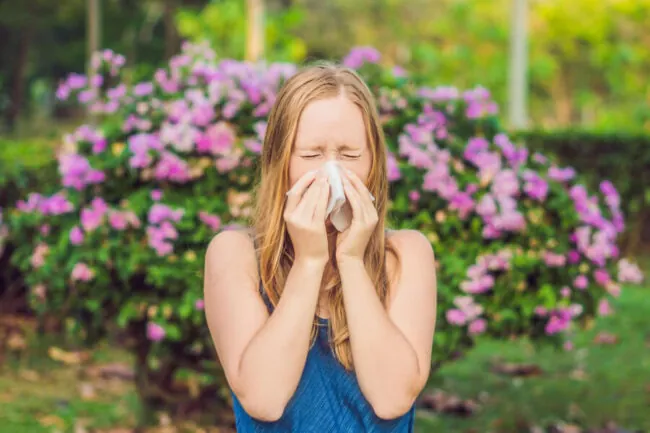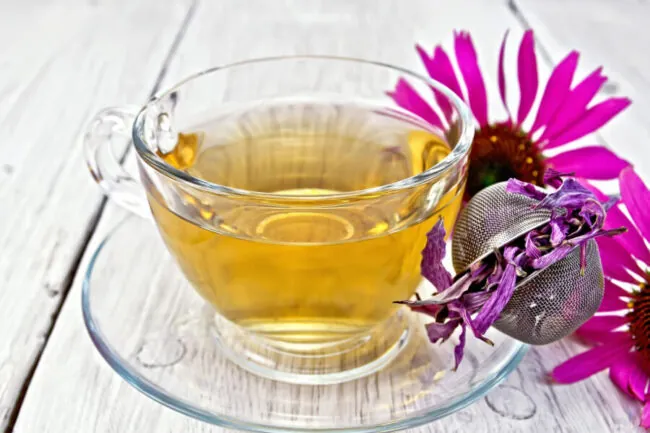What is Echinacea?
Echinacea is a type of plant in the daisy family, also known as the purple coneflower. It’s native to North America, and Native American tribes have been using it for centuries for its medicinal properties.
Its bright, daisy-like flowers not only look great in gardens but also pack a powerful health punch. Let’s take a closer look at echinacea and see why it’s a popular choice for herbal remedies.
Overview of Echinacea
The main thing people know about it is that it boosts the immune system.
But there’s more to it than that. It contains active ingredients like alkamides, glycoproteins, polysaccharides, and caffeic acid derivatives.
These contribute to its overall benefits. There are several species of it, but the most commonly used in herbal medicine are Echinacea purpurea, Echinacea angustifolia, and Echinacea pallida.
Echinacea Health Benefits
Boosting the Immune System
One of the best things about it is that it boosts your immune system. Echinacea is believed to increase the number of white blood cells, which are essential in fighting infections.
This makes it a popular choice for warding off colds and flu. Studies have shown that it can reduce the severity and duration of cold symptoms. Imagine getting through the cold season with fewer sniffles and quicker recoveries!
Reducing Inflammation
Inflammation is a natural response by the body to injury or infection, but chronic inflammation can lead to various health issues.
Echinacea has been found to have anti-inflammatory properties, making it beneficial for conditions like arthritis.
The active compounds help to reduce inflammation by inhibiting the production of inflammatory cytokines. Think of it as a natural way to soothe those achy joints!
In today’s fast-paced world, anxiety is a common issue many people face. it might offer some relief. Certain species have been found to contain compounds that reduce anxiety by regulating synapses and neurotransmitters in the brain.
While more research is needed, the calming effect of echinacea could be a natural way to manage everyday stress and anxiety.
Promoting Skin Health
it is also a boon for your skin. Its anti-inflammatory and antimicrobial properties make it effective in treating skin conditions like acne and eczema.
it extracts can be found in creams and ointments designed to improve skin health and appearance. Imagine having clearer, healthier skin thanks to this pretty flower!
Supporting Respiratory Health
Breathing easy is something we all take for granted until we’re hit with a respiratory issue.
Echinacea has been used to support respiratory health by reducing symptoms of bronchitis and sinusitis.
Its ability to boost the immune system and reduce inflammation makes it effective in managing respiratory infections. Next time you’re feeling a bit congested, echinacea might be worth a try.
Contraindications and Side Effects
While echinacea has many benefits, it’s important to be aware of potential contraindications and side effects.
Potential Interactions with Medications
It can interact with certain medications, including immunosuppressants and drugs metabolized by the liver’s cytochrome P450 enzyme system.
If you’re taking medications, it’s essential to consult with a healthcare professional before starting echinacea to avoid any adverse interactions.
Some individuals may experience allergic reactions to echinacea, particularly those who are allergic to plants in the daisy family (such as ragweed, chrysanthemums, marigolds, and daisies). Symptoms can range from mild (like a rash) to severe (such as anaphylaxis). Always start with a small dose to ensure you don’t have an adverse reaction.
Special Precautions and Warnings
It is generally considered safe for short-term use. However, certain groups should exercise caution.
Pregnant and breastfeeding women, people with autoimmune disorders, and individuals with chronic health conditions should consult with their healthcare provider before using It. Long-term use of echinacea may also lead to immune system suppression, so it’s best used intermittently.
Dosage Recommendations
Suggested Dosages for Different Forms
Echinacea is available in various forms, including capsules, tablets, liquid extracts, and teas. The appropriate dosage can depend on the form you choose:
- Capsules/Tablets: Typically, 300-500 mg, three times a day.
- Liquid Extracts: 2.5 ml, three times a day.
- Tea: 1-2 grams of dried echinacea root or herb per cup of boiling water, steeped for 10 minutes, consumed three times a day.
Always follow the dosage instructions provided on the product label or by your healthcare provider.
How to Use Echinacea Safely
Best Practices for Consuming Echinacea
To maximize the benefits and minimize the risks, follow these best practices:
Start Slowly: Begin with a lower dose to gauge your body’s response.
Follow Guidelines: Adhere to recommended dosages and do not exceed them.
Monitor for Reactions: Watch for any adverse reactions, especially if you have a history of allergies.
Consult a Professional: Always talk to a healthcare provider if you’re unsure about taking it, especially if you’re on medication or have a chronic condition.
Tips for Avoiding Adverse Effects
- Cycle Use: Avoid using it continuously for more than 8 weeks to prevent potential immune system suppression.
- Combine Wisely: If using other supplements or medications, check for potential interactions.
- Quality Matters: Choose high-quality products from reputable brands to ensure purity and potency.
Conclusion
Using it for your wellness routine can offer numerous benefits, but it’s important to do so with care. By being aware of the potential contraindications and following best practices for safe use, you can enjoy the benefits of this remarkable herb.
Whether you’re looking to boost your immune system, manage anxiety, or improve your skin health, it has something to offer.
Always consult with a doctor to make sureit’s the right choice for you.
FAQs
Who Should Not Take Echinacea?
Individuals with autoimmune disorders, pregnant and breastfeeding women, and those allergic to plants in the daisy family should avoid it unless advised otherwise by a healthcare professional.
What is a Contraindication for Echinacea?
Contraindications include allergies to it or related plants, interactions with certain medications (especially immunosuppressants), and caution in individuals with chronic health conditions.
What are the Pros and Cons of Echinacea?
Pros: Boosts immune system, reduces inflammation, manages anxiety, promotes skin health, supports respiratory health. Cons: Potential allergic reactions, interactions with medications, not recommended for long-term use in certain individuals.
What Happens if You Take Echinacea Every Day?
Taking it for every day for an extended period may lead to immune system suppression. It’s best to use echinacea intermittently and not for more than 8 weeks at a time.








